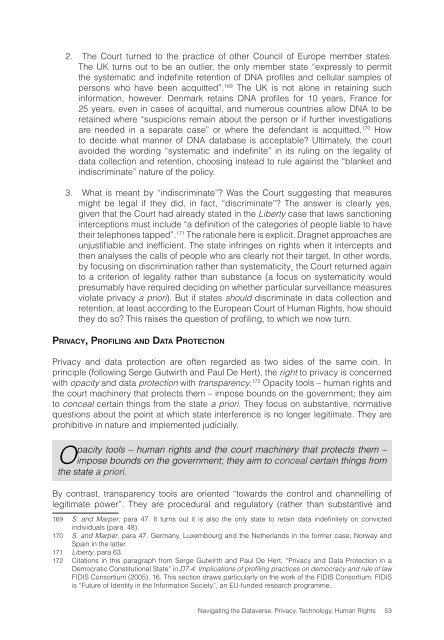Navigating the Dataverse: Privacy, Technology ... - The ICHRP
Navigating the Dataverse: Privacy, Technology ... - The ICHRP
Navigating the Dataverse: Privacy, Technology ... - The ICHRP
Create successful ePaper yourself
Turn your PDF publications into a flip-book with our unique Google optimized e-Paper software.
2. <strong>The</strong> Court turned to <strong>the</strong> practice of o<strong>the</strong>r Council of Europe member states.<br />
<strong>The</strong> UK turns out to be an outlier, <strong>the</strong> only member state “expressly to permit<br />
<strong>the</strong> systematic and indefinite retention of DNA profiles and cellular samples of<br />
persons who have been acquitted”. 169 <strong>The</strong> UK is not alone in retaining such<br />
information, however. Denmark retains DNA profiles for 10 years, France for<br />
25 years, even in cases of acquittal, and numerous countries allow DNA to be<br />
retained where “suspicions remain about <strong>the</strong> person or if fur<strong>the</strong>r investigations<br />
are needed in a separate case” or where <strong>the</strong> defendant is acquitted. 170 How<br />
to decide what manner of DNA database is acceptable? Ultimately, <strong>the</strong> court<br />
avoided <strong>the</strong> wording “systematic and indefinite” in its ruling on <strong>the</strong> legality of<br />
data collection and retention, choosing instead to rule against <strong>the</strong> “blanket and<br />
indiscriminate” nature of <strong>the</strong> policy.<br />
3. What is meant by “indiscriminate”? Was <strong>the</strong> Court suggesting that measures<br />
might be legal if <strong>the</strong>y did, in fact, “discriminate”? <strong>The</strong> answer is clearly yes,<br />
given that <strong>the</strong> Court had already stated in <strong>the</strong> Liberty case that laws sanctioning<br />
interceptions must include “a definition of <strong>the</strong> categories of people liable to have<br />
<strong>the</strong>ir telephones tapped”. 171 <strong>The</strong> rationale here is explicit. Dragnet approaches are<br />
unjustifiable and inefficient. <strong>The</strong> state infringes on rights when it intercepts and<br />
<strong>the</strong>n analyses <strong>the</strong> calls of people who are clearly not <strong>the</strong>ir target. In o<strong>the</strong>r words,<br />
by focusing on discrimination ra<strong>the</strong>r than systematicity¸ <strong>the</strong> Court returned again<br />
to a criterion of legality ra<strong>the</strong>r than substance (a focus on systematicity would<br />
presumably have required deciding on whe<strong>the</strong>r particular surveillance measures<br />
violate privacy a priori). But if states should discriminate in data collection and<br />
retention, at least according to <strong>the</strong> European Court of Human Rights, how should<br />
<strong>the</strong>y do so? This raises <strong>the</strong> question of profiling, to which we now turn.<br />
<strong>Privacy</strong>, Profiling and Data Protection<br />
<strong>Privacy</strong> and data protection are often regarded as two sides of <strong>the</strong> same coin. In<br />
principle (following Serge Gutwirth and Paul De Hert), <strong>the</strong> right to privacy is concerned<br />
with opacity and data protection with transparency. 172 Opacity tools – human rights and<br />
<strong>the</strong> court machinery that protects <strong>the</strong>m – impose bounds on <strong>the</strong> government; <strong>the</strong>y aim<br />
to conceal certain things from <strong>the</strong> state a priori. <strong>The</strong>y focus on substantive, normative<br />
questions about <strong>the</strong> point at which state interference is no longer legitimate. <strong>The</strong>y are<br />
prohibitive in nature and implemented judicially.<br />
Opacity tools – human rights and <strong>the</strong> court machinery that protects <strong>the</strong>m –<br />
impose bounds on <strong>the</strong> government; <strong>the</strong>y aim to conceal certain things from<br />
<strong>the</strong> state a priori.<br />
By contrast, transparency tools are oriented “towards <strong>the</strong> control and channelling of<br />
legitimate power”. <strong>The</strong>y are procedural and regulatory (ra<strong>the</strong>r than substantive and<br />
169 S. and Marper, para 47. It turns out it is also <strong>the</strong> only state to retain data indefinitely on convicted<br />
individuals (para. 48).<br />
170 S. and Marper, para 47. Germany, Luxembourg and <strong>the</strong> Ne<strong>the</strong>rlands in <strong>the</strong> former case; Norway and<br />
Spain in <strong>the</strong> latter.<br />
171 Liberty, para 63.<br />
172 Citations in this paragraph from Serge Gutwirth and Paul De Hert, “<strong>Privacy</strong> and Data Protection in a<br />
Democratic Constitutional State” in D7.4: Implications of profiling practices on democracy and rule of law<br />
FIDIS Consortium (2005), 16. This section draws particularly on <strong>the</strong> work of <strong>the</strong> FIDIS Consortium. FIDIS<br />
is “Future of Identity in <strong>the</strong> Information Society”, an EU-funded research programme.<br />
<strong>Navigating</strong> <strong>the</strong> <strong>Dataverse</strong>: <strong>Privacy</strong>, <strong>Technology</strong>, Human Rights 53
















